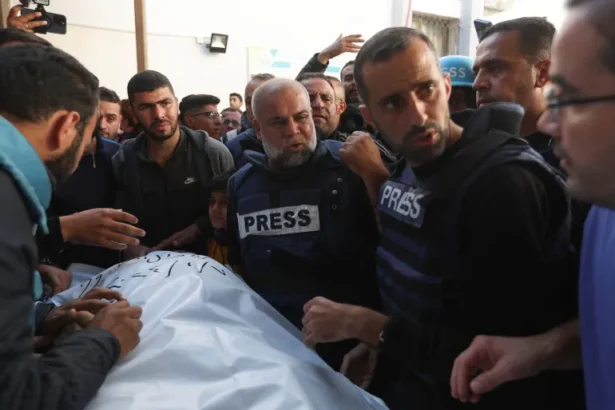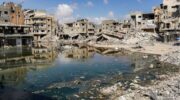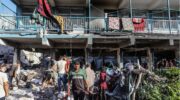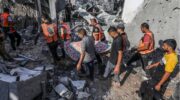Israel is killing Palestinian journalists, banning foreign media from reporting on Gaza – and losing credibility.
by Rami G Khouri, reposted from Al Jazeera, April 2, 2024
For the past six months, Israel has put a lot of effort into covering up its genocidal crimes in Gaza. One of the most brutal ways it does this is by routinely threatening, targeting and assassinating Palestinian journalists.
The US-based Committee to Protect Journalists (CPJ) has reported that at least 90 Palestinian journalists have been killed since October 7 alongside two Israelis and three Lebanese. This is the highest death toll of journalists in any modern conflict that CPJ has monitored. Another 25 Palestinian journalists have been detained by Israeli forces, and four are missing.
Israel also bans foreign media outlets from entering Gaza, forcing them to report from Tel Aviv, Jerusalem or southern Israel. On Israeli territory, they must comply with the rules and censorship of the Israeli Military Censor, which is part of the Israeli army and requires media materials be submitted for its review prior to publication or broadcasting. On Monday, the Israeli Knesset also passed a law allowing its government to shut down news networks. Prime Minister Benjamin Netanyahu has vowed to use the legislation to ban Al Jazeera.
Killing journalists and censoring media operating in Israel are supposed to ensure that global coverage reflects Israel’s spin on events or ignores aspects of its scorched earth conduct in Gaza.
But this strategy is failing for three reasons. First, because scores of highly motivated Palestinian journalists continue to brave Israeli bombardment and fire to report on events on the ground. Second, because ordinary Palestinians also document and share on social media their coverage of events. Third, because international media increasingly question Israeli accounts of events and demand more verified facts.
Worse for Israel, its behavior to kill first, accuse the dead of terrorism and then not answer any questions is actually backfiring. It is generating greater global attention and media coverage of the assassinations of Palestinian journalists along with demands for Israeli political and legal accountability, which increased after the International Court of Justice (ICJ) proclaimed that Israel is “plausibly” carrying out genocidal acts in Gaza.
This backlash is increasingly apparent even in American mainstream media, which tend to slant pro-Israel. In an unusually bold article published on CNN’s website on March 20, Oliver Darcy, the channel’s senior media reporter, openly criticized the Israeli armed forces and government for the deaths of journalists in Gaza.
“With each death, the world sees a little less from the war-torn region. It is incumbent on Israel, which is responsible for the conduct of its military forces, to fully explain its actions when a member of the press is killed. So far, however, the [Israeli military] has been less than forthcoming,” Darcy wrote.
United States media outlets have also launched their own investigations into the assassinations of Palestinian journalists. The Washington Post, for example, investigated the killings of two Palestinian journalists – Al Jazeera’s Hamza Dahdouh and Mustafa Thuraya – by an Israeli missile that hit their car on January 7 near Khan Younis. Its research raised significant doubts about Israel’s explanation that the men were “terrorists” who threatened Israeli troops.
Representatives of major US media outlets – including NBC, CNN, The New York Times and The New Yorker – also signed a letter with other foreign media organizations calling on Israel to protect Palestinian journalists’ rights and hold to account those responsible for their deaths.
Meanwhile, various nonprofit organizations have dedicated significant resources to covering the violations against and killings of Palestinian journalists. The CPJ, Reporters Without Borders and the International Federation of Journalists (IFJ), which represents 600,000 journalists in 140 countries, have issued regular reports on the situation in Gaza. On February 26, the IFJ observed the International Day for Palestinian Journalists and called on its affiliates to support and come out in solidarity with them.
The Security in Context network of international scholars published a paper revealing how Israel restricts media “beyond detentions and assassinations, to target media institutions, resulting in the complete or partial destruction of over 60 local and foreign media institutions”.
The United Nations has also extensively documented the plight of Palestinian journalists. In early February, five special rapporteurs of the UN Office of the High Commissioner on Human Rights warned: “We have received disturbing reports that, despite being clearly identifiable in jackets and helmets marked ‘press’ or traveling in well-marked press vehicles, journalists have come under attack, which would seem to indicate that the killings, injury, and detention are a deliberate strategy by Israeli forces to obstruct the media and silence critical reporting.”
They asked the ICJ and the International Criminal Court to pay special attention to crimes committed against Palestinian media workers.
Many more international expressions of support for Palestinian journalists have come from their colleagues around the world.
Seasoned American journalist Lawrence “Larry” Pintak, for decades a CBS foreign correspondent and later the founding dean of the Edward R Murrow College of Communication at Washington State University, is certain that Israel has attacked and killed journalists – because he experienced one such attack on his own film crew in southern Lebanon in 1984.
“This is not a new story,” he told me in a recent interview. “Journalists who know the Middle East have no doubt that Israel has targeted journalists, as many of us witnessed first-hand. But it is also likely that some were killed by random hits.”
Only independent investigations can reveal the facts of any killing, but Israel never allows these to happen. The cumulative evidence of Israel assassinating journalists causes more international media organizations and individuals to doubt Israeli accounts of new deaths, Pintak said.
“We journalists are a tribe, and we become defensive when someone attacks us. This is happening with Israel’s repeated denial that it kills journalists. It creates a backlash, for sure, as the media now demands more facts before believing or rejecting Israel’s accounts, and media organizations themselves now conduct many of the forensic investigations that generate facts.”
Israel’s attacks on journalists increase scrutiny, rather than curtail it, as scores of highly motivated younger Palestinian journalists simply “pick up the fallen cameras of their assassinated colleagues and keep filming”, he said.
Apart from extending solidarity within the profession, media professionals across the world are also concerned about the larger effect of the impunity with which Israel targets Palestinian journalists.
Julia Bacha, award-winning producer of Boycott and other documentaries on Palestine-Israel, explained in a phone interview that beyond Israel’s criminal actions and Palestinian families’ grief, the targeting of Palestinian journalists endangers their colleagues elsewhere as well.
“This issue is critical because what happens here will impact journalism elsewhere for years. We cannot let this moment in modern history of the unprecedented rate of killing journalists pass without urgent action to protect the media during wars. It would send a very bad message to others in the world, especially autocrats who feel they can ignore laws and kill journalists as they wish. Journalists must be allowed to work safely because we can only hold people accountable for criminal deeds if we have the facts that only on-the-spot journalists can gather, verify and disseminate,” she explained.
Indeed, by mass killing Palestinian journalists, Israel positions itself alongside other brutal regimes that deny or restrict media coverage of their actions, which further exposes the big holes in its democratic credentials that it tries to project to international media. By attacking Palestinian journalists and denying foreign media access to Gaza, it has shot itself in the foot and weakened its own credibility.
Israel is clearly losing its war on truth.
Rami G Khouri is a Distinguished Fellow at the American University of Beirut, and a journalist and book author with 50 years of experience covering the Middle East.
RELATED:





